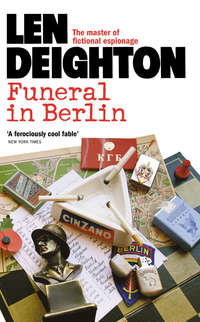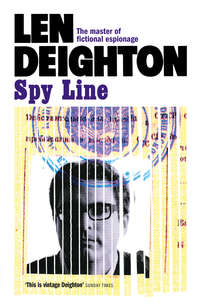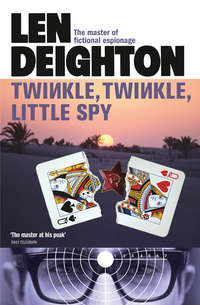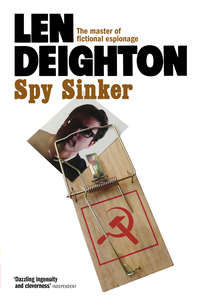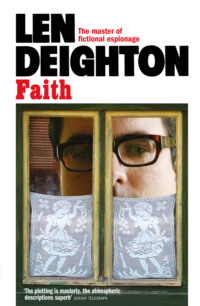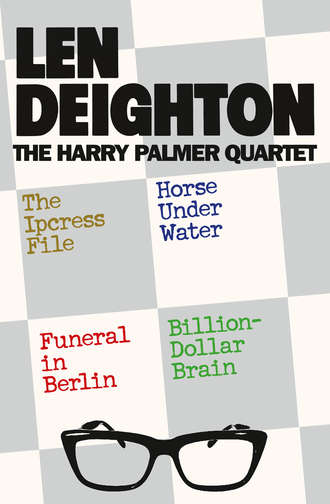
Полная версия
The Harry Palmer Quartet
1 See Appendix: Joe One
2 Approximately 2,500 times the destructive power of the Hiroshima explosion.
3 For details see Appendix
19
[Aquarius (Jan 20–Feb 19) People you work with seem to misunderstand your intentions, but don’t brood – look on the cheerful side.]
The heat rocketed back from the burning sand underfoot. The red painted framework of girders that made the shot tower blistered the careless hand. Wriggling away from the legs of the tower, black smooth cables and corrugated pipelines rested along each other like a Chinese apothecary’s box of snakes. Fifty yards away a twenty-foot-high electric fence, circumscribing the tower, was manned by white-helmeted police with panting Alsatian dogs on short leashes. A white amphibious jeep was parked near the only gate, its awning modified to permit the traverse of a half-inch-calibre machine-gun. The driver sat with hands clasped high on the steering-column, his chin resting on the back of his thumb. His helmet liner was painted in lateral black and yellow two-inch stripes to show he had a ‘Q’ permit. He looked like Danny Kaye.
Half a mile away across the flat sand I could see small shimmering black figures adjusting the automatic cameras which at this range could only be preserved by a freak of failure. With a well-oiled sound a three-man lift dropped down the tower with the accuracy of a guillotine blade and bobbed gently on its spring cushion. My guide was a small lizard-like civilian with hard, horny hands and face, and the lightest blue eyes I ever saw. His white shirt had small darns such as only a loving wife can do, and only a tight salary bracket make necessary. Across the back of one hand was a faded tattoo, an anchor design from which a name had been erased. The plain gold signet-ring caught the sun through his copious white hair.
‘I’ve got a meter here with mercury in it.’ I tapped the old leather brief-case. ‘It had better not go near the cold box.’ I looked up to where the pipes got thicker and more numerous two or three platforms up. I pointed vaguely. ‘The refrigeration chamber might react.’ I looked up again, and he looked at my badge and read the words, ‘Vickers Armstrong Engineering’. He nodded without much emotion.
‘Don’t let anybody touch it.’ He nodded again as I opened the wire gate of the lift and stepped in. I pulled the little handle and we stood motionless, looking at each other as the motor whirled away its inertia. ‘Down in a minute,’ I said, rather than just stand there dumbly. He nodded his white head slowly and deliberately, as one would to a sub-intelligent child or foreigner, and the lift surged upward. The red girders cut the white hot sand into Mondrian-like shapes moving before me more quickly as the lift gained speed. The wire roof divided the dark-blue sky into a hundred rectangles as the oily steel lift cable passed me on its journey downward. No sooner did the platforms permit me to peek over them than they fell away beneath my feet. For 200 feet I rocketed into the air, the circle of fencing falling around my feet like a spent hula hoop. Through the crack in the floorboard I watched the white police jeep lazily trot round the tower, on the sand that the explosion would transform into glass.
Suddenly the motor cut out and there I hung bouncing in space like a budgerigar in a sprung cage. I slid the gate aside and stepped out on to the top platform. I could see right across the island. To the south the sharp runways of Lay Field contrasted strangely with the irregular patterns of nature all around. A B52 was taking off from the field. Its heavy fuel for the long transpacific journey challenging it to defy gravity. Other smaller, rockier islands played bob-apple in the ocean waves. Beneath my feet the complexities of machinery reached their most frenetic maze. I was standing atop the thing that all this was about, this atoll, this multi-million-dollar city, this apogee of twentieth-century achievement, this focus point of hemispherical animosity, this reason why a Leeds supermarket operator can’t afford a third car, and a farmer in Szechwan a third bowl of rice.
Because it was all these things the shot tower was generally called ‘the mountain’, and because it was called that I wasn’t surprised to find Barney waiting at the summit.
Barney was dressed in white, super-lightweight coveralls. On his arm were the stripes of a master-sergeant, in his hand a .32 pistol with silencer. It just happened to be pointing at me.
‘I’d just better be right about you, pale-face,’ he said.
‘You’d just better had, Sambo. Now ease down the drama and tell me what’s on your mind.’
‘You are.’
‘You’re nice.’
‘Don’t fool, because I’m sticking my neck right out, but I can rack it in, but very fast. We knew each other well once, but people change and I just need to look, to see. Have you changed?’
‘Probably I have.’
There was a long silence. I didn’t know what Barney was talking about, or what Barney was getting at. I was almost thinking out loud when I said, ‘One morning you wake up and find all your life-long friends changed. They had turned into the sort of people you mutually despised not so long ago. Then you start worrying about yourself.’
‘Yeah,’ said Barney. ‘And they’ve stopped being interested in doing anything about those same jerks.’
‘I’m interested.’
‘That’s ’cos you don’t know when you’re licked.’
‘Maybe it is. But I don’t lure people into the barrel of a police special to prove it.’ He didn’t smile. Maybe I hadn’t made a joke.
He said, ‘So I’ve changed, so I’m a nut. Listen, white man, do you know the hottest piece of merchandise on this island …’
‘Aren’t I standing on it?’ I said.
‘Not unless you’re standing on your own neck; the hottest thing on this island is you. You’re bugged, you’re strapped down, you’re pickled. “The friends”1 have the word that you’ve walked away. Have you walked away, just a little way? Did you put a down payment on a dacha with some old stuff you knew they had anyway? Just tell me.’
‘Just tell you?’ I said. ‘Just tell you? So the friends fling me half-way around the world for you to finger me on a bomb platform. But before that happens I just tell you? Are you crazy?’
‘Am I crazy? Are you crazy? One of us probably is but there’s a wild little chance that we are both smarter than anyone else around here.’ Barney’s hot glistening face was three inches from mine. And time stopped in a frozen minute of suspended silence. My mind photographed a wave in mid splash; Danny Kaye far below me, helmet off, wiping his brow on a white handkerchief. ‘I’ll be DED if anyone knows I’ve even spoken to you. Why do you think that they have that creep fixed on Skip as firmly as a scar, and that blonde cow welded to me? I’m greasing the skids to the morgue just coming within loudhailer distance of you.’
‘So why aren’t you buying a subscription for my funeral?’ I asked.
‘I don’t know why. I suppose because after a little while in this business you start getting egoistic about judging character.’
‘Thanks.’ It seemed a pretty lame thing to say. We stood looking at each other and Barney went across to the lift and jammed a glove into the handle so that it couldn’t be controlled from the ground. Barney spoke quietly – ‘I’m the only character around here who’d give you half a whirl, the only one.’ He paused. ‘Even that girl is half-way convinced.’ He flapped a hand. ‘Never mind how I know; I know. But on the other hand I’ve seen a few coloured guys given the heave-ho. I’m difficult to convince when it comes to concerted action against a guy who maybe doesn’t know what it is tiptoeing up behind him. Afterwards it tends to be too late to find out if anyone made a mistake.’
I started to speak. I don’t know whether I was going to argue, thank him or apologize, but he waved his heavy pink palm across his chest.
‘Don’t thank me. Skip didn’t have the opportunity I had. It’s my sergeant you should be thanking. He’s out there on one of those generator trucks making like he’s me. We’re just relying on the fact that most tall niggers look alike to pale-faces.’ Barney opened his mouth in a symbol of a grin; there was no mirth in it whatsoever. ‘Anything he gets will really be for nothing.’
‘Wait a minute – let me fasten on to all this,’ I said.
‘You haven’t got the time, fella. Just forget you ever saw me and light out, especially both those things.’
My mind was dizzy trying to think. Maybe, I kept thinking, Barney had slid off his trolley. But I knew Barney was right. It made sense from too many puzzling things to be anything but true.
‘We daren’t be seen here, man. I must bend the shoes!’
‘Will you let me have the gun, Barney?’
‘The heater, man. You ain’t going to shoot your way out of this installation. If you want to do yourself a favour, start talking, and talk your way on to a fast plane OUT.’
‘The gun.’
‘Okay. Be a nut.’ Barney threw me the gun and a small metal reel all prepared for me. I raised the leg of my trousers and using the reel of sticking-plaster, stuck the gun to the outside of my right leg. When I covered it again, Barney passed me a dark-blue thin canvas belt. It was about five inches deep and similar to the ones used by gold smugglers. I undid my trousers and strapped the heavy, sweaty belt, full of automatic clips, under my shirt. Barney having retrieved his glove, climbed out over the rim of the platform. He swung down the narrow ladder and paused as his neck came level with my feet. I guess he was wondering whether I might not kick him into oblivion. He looked at the toe of my shoe reflectively, and hammered his fist softly against it in a gesture of farewell. As he looked up, I once more found my mind committing the details to memory. I remember his wide handsome face like we all remember the rivets on our dentist’s spectacles.
‘And don’t go sobbing to your new boss, paleface.’
‘Dalby’s convinced, too, huh?’ I paraded all Dalby’s words and attitudes over the last few days through my mind.
‘Him speak with knife-and-forked tongue, man.’
I put the sole of my shoe on Barney’s knitted hair. ‘Get out of here, you bum,’ I said.
‘You could do yourself just that favour,’ Barney said. ‘Try for vertically.’
The journey down seemed faster than the journey up. The white-haired little guy had put my case out of the sun. I picked it up and we walked back towards the gate. A truck had stopped at the gate and the driver was getting out so that a policeman could drive it up to the tower. In the jeep Danny Kaye was talking to the gunner earnestly. I suppose they were discussing whether to make anti-clockwise the next time round the tower. The white-haired one and me flipped them our security cards but they didn’t seem to know that the hottest piece of merchandise on the island was padding out of their vicinity. We had a new Chev parked outside the gate. We got in to drive back to the mess.
‘Meters don’t have mercury in,’ said the old man; he had a hoarse voice like Fred Allen.
I didn’t want to argue, I was too hungry. Anyway, a hydrogen bomb tower doesn’t have a refrigeration chamber, so who cared.
So Jean was ‘half-way convinced’. I remembered her the night previous. Her hair shining and her eyes full of consolation for Barney’s obvious snub. I remembered the way she’d said, ‘He wanted you to know he was doing it under orders, that’s why he said he’d eaten. He knew you wouldn’t believe it. If he’s anything like the cool character you’ve been talking about he’d certainly be able to think up an excuse for leaving a restaurant.’ I wanted to believe that. I remember Jean damping Dalby down when she could have made a better score by agreeing with him. On the other hand perhaps they had a deal about me already, and she cooled him off when I was around to soften me up. I remembered the smell of her hair when we danced, and the soft warmth of her body as we danced. And pretending to whisper things as we danced to annoy Dalby. I remembered her concern about Skip and about Barney. I remembered her red finger-nails on the back of my hand as she asked if I couldn’t understand their position and what had they said. And I could remember not telling her a damned thing.
The Officers’ Mess was a large prefabricated building near the Administration Compound. The front was decorated with small stunted flowers in the shape of a badge of the unit that built it. ‘You are now getting indigestion through the courtesy of the Army Catering Corps.’ A blast of barbecue-chicken-hot-air hit me as I went in.
Then all was cool and calm. The long white crispy tables, the jugs of ice-water making noises like the treble end of a xylophone. The stainless steel, the low murmur of serious masculine conversation, the purr of air-conditioning units. This was reality, this was the world – not the scene through the window; that was a fable.
The vichyssoise was rich with fresh cream, through which the fugitive flavour of leek came mellow and earthy; it was cold and not too thick. The steak was tender and sanguine, dark with the charred carbon of crusted juices, and served with asparagus tips and pommes allumettes. The coffee came along with strawberry short-cake. I ate it all, drank the weak coffee, then settled back with a Gauloise Blue. Poisoning seemed an unlikely method of dealing with my defection.
1 MI5.
20
[Aquarius (Jan 20–Feb 19) Actions by friends may seem strange but remember that your moodiness may influence them.]
The Officers’ Mess was a low building, prefabricated as everything on Tokwe was, and single-storeyed. I walked out through the restaurant, through the simple starched shirts, the uniformly short haircuts. Snatches of German and small bite-sized pieces of Hungarian ran like strands of a web across the clipped Harvard speech and the drawn-out vowels of men who had been at Oak Ridge for so long that it had become their permanent home. I moved slowly listening with my finger-tips. No eye followed me as I entered the lounge where gaunt tubular frames had large floral-patterned plastic padding impaled upon them in relentless discomfort. Near the window I saw Jean; the group of aircrew I had noticed at the bar the previous evening were flying close formation on her. I knew they were SAC lead crews. The lead crews were the ones with the higher scores at bombing and navigation. They are raised a rank when they become lead crews, and so these boys were majors and lieutenant-colonels. One of the biannual exams they had, involved the committing to memory of one complete enemy target briefing. If they fail the exam they revert to their old rank. This had been a complicated session in 1944, but now, flying these eight-engine B52s at 600 mph after a thirty-minute check over the intercom before take-off, it was cosmic! Finding the tanker aircraft whose crew, one hoped, was similarly skilled in navigation; refuelling in flight while moving at stalling speed behind a tanker only three feet away, and then moving on a town they had never seen except in photographs; to drop a thermo-nuclear bomb, was a test of mathematical skill, dexterity, memory, and of confidence in the judgement of their leaders unparalleled since Constantine’s Edict saw the last Christian share a double bill with the lions. Soviet air space was often penetrated at a time when an explosion or a launching was expected. These SAC people were going to observe this one from the air as a comparison. To know which Soviet ground targets these three-man crews had committed to memory would be a very valuable ‘intelligence sequence’. The chances of Jean unloading such an item from them was remote, but I sat down a few chairs away and busied myself with some old unchecked expense accounts and indents that Alice had slipped into my case at the last moment without my noticing. Jean was doing a thing that men agents have to learn, but most women do naturally. She stood back and let the conversation move between the others, listening or guiding as needed. I hope she didn’t do that funny stare she tended to do when concentrating, because these charácters wouldn’t miss it. They were tumbling over just to talk in front of her.
‘Yes, sir,’ a balding man of about thirty-eight was saying; his eyes were too small but his jaw strong and tanned.
‘But for me, New York is a city. I like to travel, I really do, but you just can’t beat little ole New York, boy!’
‘New York, I like, but it’s a little like Chi, I’d say. New Orleans – there is a city, there is a city!’
‘Then you’ve never been to Paris, France.’
‘Parley Fransays. I lived six months in Paris. Now there’s the last country on earth where women are subordinated to men.’
‘And that goes for India. Do you know, in Afghanistan a camel costs more than a wife? This old guy was sitting riding on his camel. I’d seen him around, I knew he spoke a little English. I pulled up by him. I had a little red English MGA at the time, went like a bird. “Why aren’t you giving your wife a lift, Chas?” I said. (We all called him Chas.) “No, there are minefields here near the aerodrome,” he said. “You let her walk then?” So he said, “Yes, it’s a very valuable camel.” Can you beat that? He said, “It’s a very valuable camel.”’
A tall fair-haired major diluted his drink with a splash of ice-water. ‘Bel Ami who was French, and knew all about women …’
‘You know he’s using the worst mix in the world?’ Jean opened her eyes an eighth of an inch.
‘Alaska, that’s the biggest state. Ask any Texan,’ said the balding one, and laughed.
‘And I’ll tell you the Texan answer – “Oil”.’
The tall major who knew Bel Ami, lifted his glass and contradicted, ‘You see this drink? If you were gonna measure the volume of this drink do you take account of the ice?’ He paused. ‘You don’t. And that’s how it is with Alaska. It’s all ice.’
The chuckling was interrupted by the lounge door opening; a plump major looked quizzically around the room, dark glasses bisecting his large globe-like face. Beside him a neatly assembled girl army secretary in khaki shirt and slacks, both a carefully chosen size or so too small, shifted uneasily before the clear, unequivocally carnal gaze from so many efficient male eyes. Hoping to break an atmosphere as thick as cooling fudge, the newcomer asked if anyone had seen his navigator. No one answered, and here and there an unkind grin clearly stated the alienation that his social success had wrought. He turned awkwardly in the doorway and someone said affably, ‘Give my love to your wife and children.’
The balding one took advantage of the time pause. He went on going on. ‘My pappy used to say, “Drink Scotch by itself; with rye mix a little water, bourbon, mix it with something strong, something really strong.”’ He laughed loudly. ‘Something really strong,’ he said again.
‘I like Germany. I like to eat there. I like to drink there. I like German girls.’
‘I was living in Scandinavia.’
‘It’s not the same. It’s different in Scandinavia.’
‘I was at school in a big town in northern Scandinavia,’ said Jean, jumping in agilely as an agent must, and speaking the truth as an agent should.
‘Narvik,’ said the balding one. ‘I know it very well. I knew every bar in Narvik this time last year. Right?’ he asked Jean.
She nodded.
‘How many’s that? Three?’ said the man who knew Bel Ami.
I had completed most of the indents for the typewriter ribbons, recording tape and assorted junk of every day by the time the airmen had ‘holycowed’ and ‘go-go-goed’, ‘see you latered’, ‘izz at the timed’ out of the lounge. She came up behind me and touched the top of my head. I found the unexpected intimacy of her physical contact as shocking as if she’d undressed in public. As she moved into view and sat down opposite me I reappraised her attitude. She was anxious to let me know, to reassure.
The sheer effectiveness of her reassurance precluded my trusting it. Perhaps she was my Dolobowski. She offered me one of those menthol cigarettes that taste like paint remover. I declined.
She said, ‘SAC lead crews flying B52s working out of Bodo, Norway and the new field near Herat.’ She took her time to light it with a small silver cigarette lighter. ‘I’d say committed targets; those launching sites West South West of Lake Balkach and the underwater nuclear submarine harbours in eastern Novaya Zemlya that Bobby did the work on. You probably already saw the modified bomb-bays on two of the planes.’
I nodded.
‘Two of the crews have ex-Navy bombardiers; probably a delay device operating by water pressure.’ She tilted her chin as high as possible and exhaled a stream of smoke vertically at the ceiling in an unusually theatrical way. From somewhere she had obtained a WAC officer’s summer dress, and like Dalby she had this quality of looking right in whatever she wore. She waited for praise as a small child does; posturing and preparing declaimers of skill or virtue. The days of Pacific sunshine had made her face a deep shade of gold, and her lips were light against the dark skin. She sat there studying the evenness of her finger-nail polish for a long time, and then without looking up said, ‘You went to Guildford?’
I nodded without moving my head.
‘In the first week when it’s all physical exercises and IQ tests and you mostly sit around waiting to be interviewed and talked out of staying on for a second week, there’s one lecture about cell construction and cut outs?’
I knew that she knew that this isn’t the sort of thing anyone ever talks about. I hoped that the lounge wasn’t bugged. I didn’t stop her.
‘Well, Alice is my only official contact, through her you were my permanent contact. As far as I’m concerned …’ she paused. ‘Since then I have used no other as the man in the Pears soap advertisement said.’
I sat saying nothing.
‘The complexities of my job are greater than they were in Macao. Greater than I suspected they could be,’ Jean said very quietly. ‘I didn’t see myself doing that.’ She moved her head towards where she’d been sitting. ‘But I’ll go along with it OK. But there has to be a limit as far as personalities are concerned. I am a woman. I can’t switch allegiances easily, and I am biologically incapable of answering to a group.’
‘You may be making a big mistake,’ I said, more in order to gain time than because it meant anything.
‘I don’t think so, and I’ll show you why,’ she said, ‘if you’ve an hour or so to spare.’
I had. I followed her out and across to the car park. She climbed behind the wheel of a Ford convertible, the metal and leather hot enough to produce a sickly smell. Attached to the sunshield on the driver’s side was a grey painted metal box. One face of it was perforated; it was a little larger than an English packet of twenty. This was a monitoring radio sending conversation to a receiver up to three miles away, and by means of a compass device sending a signal to show the direction and travel of the vehicle. It was a compulsory fitting to all cars on Tokwe. It was attached by means of two magnets, and I pulled it off the metal of the sunshield and buried it deep in a big box of Kleenex in the rear seat of a pink Chevrolet parked alongside. I hoped no one would bother to tune us in. If they did without a visual check we’d be just another silent vehicle in a car park outside the Mess.
The tyres made an ugly noise on the gravel as Jean let in the clutch and swung the power steering into a fierce lock. Neither of us spoke until a mile down the road we stopped to fold back the hood. I took a close look around the windscreen and door tops.
‘I think we are probably clean now but let’s be careful just the same – you were smart to take the convertible,’ I told her.
‘It cost me a four-ounce bottle of Arpège perfume to find out not to pet in any other sort of vehicle.’
‘Put it on expenses,’ I said.
For a mile or so the road was first-rate, and except for a couple of police jeeps, quite clear. Jean moved the accelerator firmly down and I heard the faint snickering noises from the gear-box as the ratios automatically changed until the road wavered under us like a heat haze, and the roar of the wind dragging across the spotlight and aerial produced an unbearable battering on the eardrums. Small flying creatures hit the windscreen and burst in ugly blotches. Jean, her head tilted back, held the wheel in a confident, loose hold, unusual in women drivers. I watched the coast flash by until we began to lose speed. I felt her foot lift from the accelerator. She’d judged the distance nicely and scarcely used the brakes. Instead of following the road where it curved left inland, to the Administration Centre, we turned off the road to the right. The wide over-sprung car lurched into the soft edges of the road and its big blue nose lifted as the tyres engaged the soil of a rough pathway. Now the going was much slower and it took nearly an hour to reach the cluster of undergrowth to which we had seen the track leading from the hard road. Jean pulled us well in under the low vegetation, and cut the motor. We had left the desiccated sectors upon which both the Administration Centre, the Mess and Living Quarters were built. This lee side of the island, shielded from the prevailing wind, was cloaked in luxuriant vegetation and punctuated by razor-sharp layers of volcanic rock. Here and there large cone-shaped mustard-yellow flowers were beginning to close their fleshy petals.


